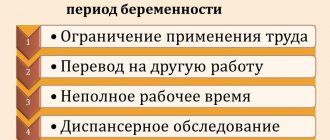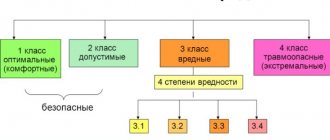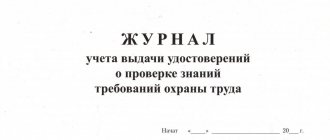Regulations on labor veterans of the Russian Federation
The title “Veteran of Labor” itself arose a long time ago, in 1974, during the heyday of the Soviet Union.
Veteran of labor in the USSR
This title was received as a reward by citizens who demonstrated success in their work over a long career, 20 years for women and 25 for men .
It was simply a moral incentive, evidence that honest work is honorable and worthy of respect. He was not entitled to any privileges or advantages in material terms; there were no monetary payments or benefits of any kind.
Simply, in a solemn atmosphere, a person was given a badge (or a medal with a certificate), kind words were said - and that’s all. This was done not only at the state level, but also at enterprises, both industrial and agricultural, and in various departments.
Any collective farm or factory could come up with a medal with an original design and present it to worthy employees who have worked at this enterprise for 10-15 years. And if a person worked in one place for 25 years or longer, then he was awarded even more honorary titles and badges.
These signs usually took the form of a medal with a corresponding inscription, and certificates were attached to them.
And only in 1995, when the Soviet Union had already collapsed, Federal Law No. 5-F of January 12, 1995 was adopted, which was called “On Veterans,” and benefits for veterans already appeared there.
It was in effect until 2005, and it clearly described how and to whom the title “Veteran of Labor” could be awarded, what specific benefits were given to the holders of this title and how they were financed.
The responsibility to provide the benefits prescribed by law lay with the federal budget, and citizens had a clear idea of what exactly they would receive if they were recognized as labor veterans.
Labor veteran in the Russian Federation, since 01/01/2005
Federal Law No. 122 treated labor veterans harshly at the time; it caused great unrest in society. This is the notorious law “On the monetization of benefits,” which transferred the provision of benefits to labor veterans to the jurisdiction of regional authorities.
This not only lowered their status, but also called into question the actual receipt of benefits: everyone understands that the capabilities of the regions in terms of resources are significantly inferior to the federal budget. Moreover, regional authorities were given the opportunity to independently determine the content of benefits and their monetary compensation - of course, based on their capabilities.
It turned out that the privileges of labor veterans in some regions remained at an acceptable level, while in others they were shamelessly curtailed, even to the point of being practically abolished.
Veteran of labor in the Russian Federation, since 07/01/2016
According to the amendments introduced to Federal Law No. 5-FZ, Art. 7, some wording was retained from the old edition, that is, veterans still include:
- persons who already have the title “Veteran of Labor”;
- those who had to work as children during the Second World War, provided that the total work experience of these citizens is 35 years or more for women, 40 or more for men;
- those who at one time received the honorary title of the RSFSR, USSR or Russian Federation, indicating conscientious work; these may be medals or orders of these states, as well as departmental insignia.
From July 1, 2020, after the adoption of the updated version of Law No. 5-FZ, Art. 7, the right to receive the title “Veteran of Labor” was additionally received by:
- Citizens who were expressed gratitude by the President of the Russian Federation or awarded a Certificate of Honor from the President of the Russian Federation.
- Persons who have received insignia for good service or work within the department, provided that they have worked in the relevant industry for at least 15 years, with a total experience of at least 20 years for women and 25 for men.
When the provisions of the amended law came into force, the regions were tasked with bringing their own legislation—acts affected by these provisions—into compliance with the Federal Law.
Law No. 5-FZ also contains articles dedicated to ensuring that federal policy truly ensures benefits and preferences for labor veterans.
Thus, it was proposed to find the necessary funds, despite the desire of the regions to curtail their social programs aimed at supporting labor veterans. In addition, there is an urgent need to create units focused on working with veterans.
To whom and how is the title awarded?
In accordance with current legislation, there are 4 honorary titles of veterans, including:
- WWII.
- military operations;
- military service;
- labor.
A larger number of awards occur within the fourth group. The conditions for obtaining the status of “Veteran of Labor” are as follows:
- Russian citizenship;
- availability of awards and orders;
- presence of age and length of service sufficient for retirement due to old age or long service;
- having a veteran's ID.
The regulatory legal acts clearly establish the types of awards that give the right to receive the title, these include:
- orders and medals of the USSR;
- orders and medals of Russia;
- honorary titles of the USSR;
- honorary titles of Russia;
- certificate of honor from the head of state;
- gratitude from the head of state;
- departmental insignia for merit in work or length of service;
- for starting work during the Second World War.
These rewards can be earned under the following circumstances.
| Reward | Types, basis for obtaining |
| Orders and medals of the USSR | Red Banner, Red Banner of Labor, Lenin, Red Star, Honor, Patriotic War, Suvorov, Kutuzov, Nevsky, Khmelnitsky, Ushakov, Nakhimov, Victory, Glory, Motherly Glory, October Revolution, Friendship of Peoples, Labor Glory, For Service to the Motherland, For personal courage, Komsomol. Special contributions were highlighted through awards. |
| Orders and medals of Russia | St. Catherine, St. Andrew the First-Called, St. Alexander Nevsky, St. George, Suvorov, Kutuzov, Ushakov, Nakhimov, Zhukov, Friendship, Courage, Honor, For services to the Fatherland, For military services, For naval services and service in the Navy, Parental glory. Special contributions were highlighted through awards. |
| Honorary title of the USSR | Twenty-four titles, among which are honored representatives of various professions, for example, Builder, School Teacher, Transport and Communications Worker, etc. The award occurs after presentation by the relevant department. In some cases, the minimum required experience is 15 years. Each title has its own criteria for assignment. |
| Honorary title of Russia | Sixty-five titles, among which are distinguished honored representatives of various specialties, for example, Artist, Doctor, Pilot, Inventor, Metallurgist, Scientist, etc. The basis is the achievement of 20 years of experience, the presence of other awards, and outstanding achievements in work. Each title has its own criteria for assignment. |
| Certificate of honor from the head of state | Figures from various fields who contributed to the implementation of public policy. |
| Gratitude by order of the head of state | Figures from various fields and groups for services to the country. |
| Departmental insignia | Each department establishes its own award procedure and list of insignia, for example, in the Ministry of Emergency Situations, the Ministry of Education and Science, and the border troops. The main requirement is to work in the same field for at least 15 years and have a total experience of 25 years for men and 20 years for women. |
| Labor activity during the Second World War | All persons who began working during the war and have a total experience of at least 40 years for men, 35 years for women. |
Thus, in order to obtain the right to the title “Veteran of Labor”, you must have at least one of the specified awards.
To obtain a title, you must meet the conditions of age and length of service. They must meet the requirements for retirement according to the latest innovations.
| Category | Retirement requirements |
| Women | Age – 60 years Experience – 15 years Number of points – 30 |
| Men | Age – 65 years Experience – 15 years Number of points – 30 |
| Representatives from the education sector | Experience – 25 years Deferment after achieving experience – 5 years |
| Healthcare representatives | 25 years of experience in rural areas, 30 years in urban areas Deferment after achieving experience - 5 years |
| Representatives of creative professions | Experience: 15–30 years depending on the direction Age: 55–60 years depending on the direction |
| Mothers with 3,4 and 5 children | Raising children under 8 years old Experience – 15 years Number of points – 30 Age - 50 years at the birth of five children, 56 at the birth of four children, 57 years at the birth of three children. |
| Residents of the North | Experience in the North – 15 years Total experience – 20 years for women, 25 for men Sum of points – 30 Age – 55 years for women, 60 – for men. |
| Residents of areas equated to the North | Experience in the Far North – 20 years Total experience – 20 years for women, 25 for men Sum of points – 30 Age: 55 years for women, 60 for men. |
| Employees of hazardous industries | Total experience: 20 years for men, 15 for women Experience in hazardous work – 10 years for men, 7 years and 5 months for women Number of points – 30 Age – 50 years for men, 45 for women |
| Employees of hazardous industries | Total experience – 25 years for men, 20 for women Experience in hazardous work: 12 years and 5 months for men, 10 years for women; Number of points – 30 Age: 55 years for men, 50 for women |
| Civil servants | Age: 65 years for men, 63 for women. Civil service experience: 20 years. |
| Military personnel | Service – 20 years Age – 45 years Total experience – 25 years Service – 12.5 years. |
If the title “Veteran of Labor” was awarded in the USSR, this does not cancel its validity.
Once these conditions have been met, you can begin processing documents. How is the title “Veteran of Labor” awarded?
Documents required to obtain the title “Veteran of Labor”
Labor veterans are of federal and regional significance. Law No. 5-FZ obliges regions in Article 22 to independently create a list of preferences intended for labor veterans.
However, when summarizing all federal legislation, it becomes obvious that some benefits are common to all regions and are interpreted as federal. At the same time, there are also purely regional ones, which the subject of the federation establishes itself, and they operate only on its territory. A labor veteran of regional significance may qualify for these benefits.
Certificate of "Veteran of Labor"
To take advantage of the rights of a labor veteran, they must be properly registered. Having recognized the right of a citizen to this title, the executive body responsible for this area presents him with the “Veteran of Labor” certificate. It is this document that certifies the right to receive the required benefits and allowances.
Since such a document is subject to strict accountability, it must be protected, and in case of loss, you should contact the place where it was received and make an appropriate statement.
Medal "Veteran of Labor"
When the Veteran of Labor medal was awarded in the Soviet Union, citizens did not suspect that this item, at that time purely symbolic, essentially playing the role of a memorial sign, could many years later become a source of additional benefits.
Nevertheless, this is what happened. The presence of a person’s “Veteran of Labor” medal, received in the USSR or the RSFSR and confirmed by the appropriate certificate, is a full-fledged basis for conferring a similar title in the Russian Federation, with all the ensuing consequences.
In the USSR, such medals were awarded to children who worked during the Second World War; they were awarded to workers and collective farmers to commemorate their conscientious many years of work for the benefit of the Motherland. Often, workers retiring were celebrated in this way in order to somehow appreciate their services to their native enterprise.
What benefits are provided to labor veterans?
In recent months, pension reform has been vigorously discussed, the significance of which for older people is very great. The essence of the innovations comes down to raising the age limit for working citizens upon retirement. Rumor has it that it will be even harder to get a veteran of labor medal. And this medal allows you to claim serious benefits:
- free medicine, including dentures;
- partial compensation for housing and communal services;
- preferential travel on public transport;
- free housing (applies only to those who managed to get on the waiting list before 2005);
- tax discounts (in some cases, taxation is completely removed);
- free provision of vacations (relevant for veterans who continue to work officially).
Additional bonus in 2020
In the coming year, the minimum wage will increase and pensions will be indexed. Increases for labor veterans will also be indexed. Insurance pensions will increase by 7.05%. Considering that the projected inflation rate is between four and five percent, this is not too bad. It should be remembered that preferential programs in St. Petersburg, Moscow and other Russian regions may vary significantly. Below are tables confirming this fact. Here is a list of surcharges you should expect:
- Moscow – plus 850 rubles per month;
- St. Petersburg – 788;
- Sverdlovsk region – 600;
- Samara region – 500-900;
- Krasnodar region – 500;
- Perm – 300.
Documents for obtaining the title “Veteran of Labor” of federal significance
Since now questions about labor veterans are under the jurisdiction of the social security authorities, this is where you should go to carry out this procedure.
A corresponding application from the citizen is submitted in paper form, which is interpreted into electronic form.
In this case, you must provide the following documents:
- an identity card or passport of a citizen of the Russian Federation, accompanied by a copy of this document certified by a notary;
- documents certifying the length of work experience - work book;
- all possible confirmations of insignia and awards assigned to a citizen;
- pensioner ID (if the person is already one) and SNILS;
- 2 photographs in a given format;
- a certificate in the required form, issued either at the place of work or at the Pension Fund.
The listed documents are accepted in the form of copies, but the originals must be provided for verification.
An important circumstance should be noted: the legislation allows you to register the status of a veteran even before the citizen actually retires, provided that all the grounds for this are available. However, it will be possible to take advantage of the benefits provided to a veteran only upon completion of his working career.
The procedure for conferring the title “Veteran of Labor”
First, a citizen submits an application for awarding him the title “Veteran of Labor.” It is reviewed by a special commission created within the social protection authorities, based on the provided package of documents.
The legislation allows 30 days to make a decision; the citizen is informed about it within the next 5 days.
If the commission’s decision is positive, then the citizen is given a certificate conferring the status of “Veteran of Labor.” Now, from this very moment, he can enjoy all the benefits that federal legislation provides him.
Having received the certificate, the newly minted veteran of labor selects from the benefits for which he has the right to apply the necessary ones that are relevant to him, and draws up an application for their receipt.
Documents that give the right to benefits must be submitted at the place of residence, to the same social protection authorities.
At present, if you look at all subjects of the Russian Federation, no uniform rules have been developed for obtaining the status of a labor veteran. Without conflicting with federal legislation, the constituent entities of the Russian Federation are guided by their own regulations on this matter.
Infographics: “For articles by a labor veteran, you need...”
Differences by region are significant:
- often locally, departmental signs and awards are not considered the basis for a citizen to be awarded the title of labor veteran;
- in some places, on the contrary, the list of such grounds has been expanded to include donors, inventors and innovators;
- in some regions, to obtain the status of a labor veteran, it is enough only to have the required length of service, and it is not necessary to have awards.
But the procedure for obtaining the title is the same everywhere.
Paperwork
Every region of the state has its own Regulations on labor veterans. It can be read both in social security institutions at the place of registration and on Internet resources.
This provision specifies how to register the status and what papers need to be prepared. However, there is a standard set of papers that will have to be prepared to acquire the title of honorary worker.
Scroll
To acquire status you will need the following documents:
- Russian general passport;
- paper certifying work experience;
- passport size photographs.
In addition, you will need to prepare award badges on the basis of which the status is issued.
If the application is submitted not by the recipient of the title himself, but by his authorized representative, you will need to make a power of attorney at a notary office. Also, the applicant’s representative will need to prepare his passport before visiting a government institution.
Where to apply and decision deadlines
The application and set of documents must be submitted to the social security institution at the place of registration. After the application is drawn up, a meeting of the commission is scheduled to consider the applications of Russians for registration of status.
When the commission considers the petition submitted by the applicant and makes its decision, it will send a notification to the citizen. Submitted papers will be returned to the applicant. The period within which the decision is made depends on the subject of the Russian Federation . For example, in the capital, the decision is made no later than 10 days after employees of the social security institution receive the application. In the Bryansk region, a decision may take 15 days.
Sample application
If the commission makes a positive decision, it issues an administrative resolution. Now the citizen will need to come to the social security institution again to receive a certificate. This document is a form of the installed image. If a Russian loses his ID, he will need to submit an application to the institution where the document was issued. The issuance of a duplicate certificate is absolutely free.
Refusal to issue a title is possible in the following situations:
- the applicant does not meet the requirements listed in Russian laws (in terms of the level of existing awards, insurance experience);
- lack of registration in the locality in which the application was submitted;
- expiration of the validity period of the papers attached to the application;
- indication of false information in the application, use of forged documents.
In case of refusal, the commission provides a written argument that its decision is lawful, refers to Russian legislation, and indicates the reason for the refusal. The applicant will be notified of the decision made. Typically, the postal service is used to send the notice. Telephone calls are not used, as they are not considered an official way of notifying citizens about the decision made by the commission.
The state provides support to labor veterans. Thus, honorable workers are entitled to:
- be served free of charge in medical institutions;
- receive vacation at a time of year that is convenient for them;
- ride for free in municipal vehicles (if such a benefit is provided for by the laws of the constituent entity of Russia);
- receive a fifty percent discount on housing and communal services;
- undergo free dental prosthetics in municipal clinics.
The administrative and managerial apparatuses of the regions of the Russian Federation have the right to establish additional measures of social support. Thus, in the Moscow and Leningrad regions, honorable workers receive a certain amount of money every 30 days.
It is necessary to obtain the title of labor veteran, if possible. The status allows you to receive many benefits and social protection. Ordinary pensioners have a much narrower range of benefits received.
https://youtu.be/y4EcMKpGCYU
How to get the title of “Veteran of Labor” without having any awards?
This is possible in two cases:
- At the regional level, in those constituent entities of the Russian Federation where awards are not recognized as a prerequisite for obtaining the title of labor veteran.
- At the federal level, if the citizen already has this title, which was previously obtained legally; most often this applies to the small category of citizens who began working during the Second World War and retained all the required documents.
In other cases that do not fit into the usual framework, it is sometimes possible to obtain such a title through the court.
Legislative basis
Russian people have always been famous for their hard work. This is confirmed by the large number of pensioners who have deservedly received such a title as “Veteran of Labor”. As you know, to earn a pension, you need to work for 25 years, but some Russians devote most of their lives to work, going through a long career of 40 or even more years.
Now pensioners can boast that they are awarded distinctive signs for their conscientious work and contribution to the development of the economy of our country.
The title “Veteran of Labor” is honorable and serves as a kind of recognition at the state level of the labor merits of Russian workers.
With the assignment of this title, a person can simultaneously count on the provision of certain social services. guarantees.
Attention! The main law that regulates the procedure for conferring such a title as “Veteran of Labor” is Federal Law No. 5 “On Veterans”. Article 7, as well as 22, provide the norms in accordance with which this title is awarded and talk about social measures. support.
It should be noted that regional authorities are dealing with the issue of providing social support to labor veterans. Thus, in each of the constituent entities of the Russian Federation, a list of benefits is approved that labor veterans living in a particular region have the right to use.
The title is awarded only to those employees who have Russian citizenship.
Even with extensive work experience, citizens of other states living in Russia cannot apply for the title. Everything is possible only if a person obtains Russian citizenship.
The length of service that a person has earned in another country is taken into account in the total length of service, but only on the condition that a corresponding agreement has been signed between our countries (based on the Agreement of the CIS countries).
The title is assigned to citizens who have been granted a pension. It is known that it is possible to retire before the employee reaches retirement age.
According to Federal Law No. 400, if length of service allows (in a certain industry), then a person can apply for a pension (according to List No. 1 or List No. 2). That is, women can retire earlier, and not as usual - at 55 years old.
In the same way, for men whose retirement age is 60 years old, they have the right to retire earlier than this age.
Important! Starting from 2020, the retirement age will change: for men it will be 65 years old, and women will begin to retire at 60 years old.
Can a shock worker of communist labor become a labor veteran?
Many copies of this issue were broken at one time, and even today it is not difficult to find echoes of those disputes and clashes of opinions on the Internet.
In the end, the Supreme Court of the Russian Federation clarified the departmental insignia that ensure the right to receive the title “Veteran of Labor.”
The explanation presented a complete list of insignia in the work of various departments in the USSR, the RSFSR and the Russian Federation, and also listed all the bodies that had the right to establish such regalia. The result was an extensive list, but the “Drummer of Communist Labor” sign was not there.
It was established, as evidenced by the resolutions of the Presidium of the All-Union Central Council of Trade Unions of 1966 and 1969, by a joint decision of economic and trade union bodies, while the sign “Shock Worker of Communist Labor” was introduced as a moral encouragement for workers. But there was no wording indicating that it was a departmental award in the relevant Resolution of the Presidium of the All-Russian Central Council of Trade Unions.
The Supreme Court of the Russian Federation, after studying all aspects of the problem, decided that the “Drummer of Communist Labor” badge, on the grounds that it was interpreted as a special measure of moral stimulation and was awarded to citizens without reference to any specific department, cannot be considered a departmental insignia. Therefore, he was not included in the list of honorary badges of the USSR or the RSFSR, and since he is not on the list, then he cannot be considered a basis for conferring the title of “Veteran of Labor”.
Social support measures for labor veterans
Veterans of labor in today's Russia feel real support from the state.
At the federal level
The list of benefits is as follows:
- free services in public clinics;
- free travel on public transport, this applies to all types throughout Russia;
- subsidy for payment of 50% of the apartment area;
- for housing and communal services, a labor veteran pays only half of the required price, a subsidy is allocated for the rest of the payment, while local tariffs and consumption standards appear in the calculations;
- a labor veteran has the right to a 50% discount when paying a subscription fee and some services in the field of television and radio;
- when performing dental prosthetics and repairing existing dentures, if a labor veteran applies to a state medical institution, he is not charged for the work - in the general case;
- leave for a working veteran of labor is provided at a time when it is convenient for him;
- There are tax benefits relating to real estate, personal income tax and tax deductions.
At the regional level
The availability of benefits at the regional level and their level directly depends on the possibilities of local financing.
Labor veterans in the regions may be provided with additional types of social support, namely:
- in many constituent entities of the Russian Federation, a monthly supplement to pensions from local authorities has been introduced, which is subject to indexation on a general basis;
- if the size of a veteran’s labor pension is less than the subsistence minimum for a given region, then he is entitled to a corresponding social supplement from the local budget;
- if a veteran does not receive a subsidy from the federal budget, then he can receive a regional one instead;
- labor veterans are provided with subsidies for medicines;
- holders of a pensioner's social card receive benefits, which are expressed in a 5% discount on such essential products as bread, sugar, milk, poultry, sunflower oil, eggs, stewed meat, and household goods;
- a 50% subsidy is also provided for the purchase of railway and water transport tickets during seasonal tariffs on suburban routes;
- other, including tax benefits in terms of transport and land taxes established by regulations of the constituent entities of the Russian Federation.











